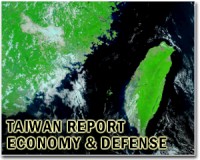 |
Beijing (AFP) Jan 30, 2010 China lashed out with a raft of reprisals Saturday after Washington announced a 6.4-billion-dollar arms package for Taiwan, escalating the biggest Sino-US crisis yet under President Barack Obama. Berating the year-old Obama administration for "crude interference" in its affairs, China said it was suspending military and security contacts with the United States, and imposing sanctions on US firms involved in the Taiwan deal. The furious riposte came a day after the Pentagon approved the sale of Patriot missiles, Black Hawk helicopters, mine-hunting ships and communications equipment for Taiwan's F-16 fleet of fighter jets among other weaponry. Chinese defence ministry spokesman Huang Xueping said the reprisals reflected the "severe harm" posed by the deal with Taiwan, which Beijing says is a part of its territory and must return to the mainland fold. But US State Department spokeswoman Laura Tischler told AFP the sale "contributes to maintaining security and stability across the Taiwan Strait." Taiwanese President Ma Ying-jeou, who has overseen a marked warming in trade and political relations with China, said Beijing had nothing to fear from the sale. "It will let Taiwan feel more confident and secure so we can have more interactions with China," Ma said, according to Taiwan's Central News Agency. However, the Chinese response underscored a rapid degeneration in relations with the United States following recent strains over trade, climate change and Google's threat to quit China. Observers said China could yet go further by rejecting new UN sanctions on Iran. Hours before the announcement on Taiwan, the United States urged Beijing to help curb Iran's nuclear programme. "Cooperation between China and the US on key international and regional issues will also inevitably be affected," China's foreign ministry said. The defence ministry's Huang said the US package "runs counter" to commitments on cooperation outlined by the two governments when Obama visited China in November. "The Chinese side will never make concessions and compromise on this issue (Taiwan)," Huang told Xinhua. China refuses to rule out the use of force to reacquire Taiwan, and has hundreds of missiles deployed against the self-governing island of 23 million people, which split from the mainland in 1949. The last US arms package for Taiwan, announced under Obama's predecessor George W. Bush in 2008, also led China to cut off military relations with the United States temporarily. But this time the sanctions were more biting, and analysts said they reflected China's increased clout at a time when its economy looks set to overtake Japan's and its military budget is surging annually. The foreign ministry said China was suspending regular military exchanges and scheduled high-level talks on strategic security, arms control and non-proliferation. US arms firms would be specifically targeted, it said. In Washington, officials said the White House was committed to Taiwan's defence and denied it was picking a fight. Obama's national security advisor, former general James Jones, said the administration was being "transparent" with Beijing, which the United States recognises as the legal government for all of China. "But we are bent towards a new relationship with China as a rising power in the world, with influence on a variety of issues that go beyond the arms sales," he said. The Pentagon said it regretted Beijing's suspension of military exchanges. "We regret that the Chinese side has curtailed military-to-military and other exchanges," Pentagon spokesman Geoff Morrell told AFP. "We also regret Chinese action against US firms transferring defensive articles to Taiwan." Chinese Vice Foreign Minister He Yafei made an urgent official protest to the US ambassador in Beijing, Jon Huntsman, Chinese officials told AFP. In a statement to Huntsman, he urged Washington to cancel the deal, which he said constituted "crude interference in China's internal affairs that seriously endangers China's national security and damages China's peaceful reunification." Despite Washington's recognition of Beijing, Taiwan enjoys high-profile backers in the US Congress, which requires the administration to provide the island with weapons of a defensive nature.
Share This Article With Planet Earth
Related Links Taiwan News at SinoDaily.com
 Taiwan cuts military spending amid improved China ties
Taiwan cuts military spending amid improved China tiesTaipei (AFP) Jan 12, 2010 Taiwan has scaled back its military budget for 2010, officials said Tuesday, amid generally warming ties with its former bitter rival China. Taiwan's parliament, controlled by the Beijing-friendly Kuomintang party, rubber-stamped a budget of 297.4 billion Taiwan dollars (9.3 billion US) for the defence ministry. It is a 6.7 percent fall from the 318.6 billion dollar budget in 2009, the C ... read more |
|
| The content herein, unless otherwise known to be public domain, are Copyright 1995-2010 - SpaceDaily. AFP and UPI Wire Stories are copyright Agence France-Presse and United Press International. ESA Portal Reports are copyright European Space Agency. All NASA sourced material is public domain. Additional copyrights may apply in whole or part to other bona fide parties. Advertising does not imply endorsement,agreement or approval of any opinions, statements or information provided by SpaceDaily on any Web page published or hosted by SpaceDaily. Privacy Statement |